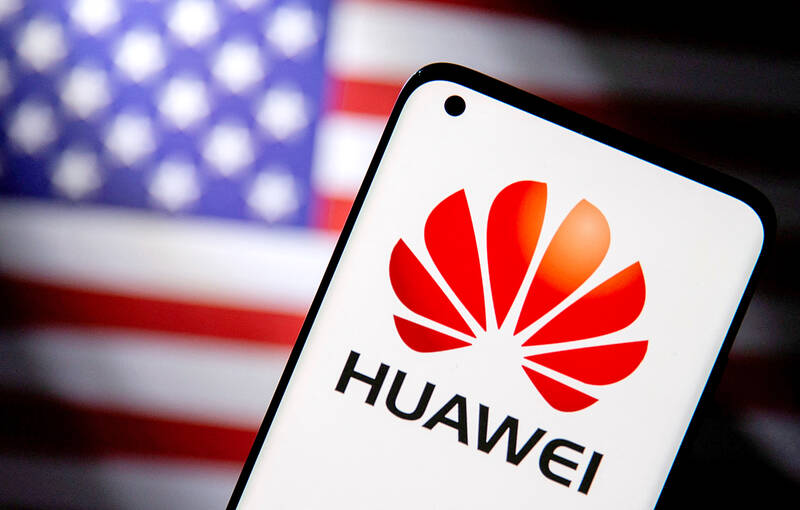Two Taiwanese companies identified in a Bloomberg report as doing business with Huawei Technologies Co (華為)-linked chipmakers in China yesterday said that their dealings in the country did not contravene US sanctions and were in line with national security laws.
Citing the Semiconductor Industry Association, Bloomberg on Tuesday reported that Huawei had set up “its own shadow network of chipmakers” with the support of the Chinese government in a bid to evade US sanctions.
Bloomberg’s report suggested that Huawei has been relying on three little-known firms in Shenzhen — Pengxinwei IC Manufacturing Co (鵬芯微), Pensun Technology Co (鵬新旭) and SwaySure Technology Co (昇維旭) — to produce chips based on its designs, with the involvement of four Taiwanese firms — chip material reseller Topco Scientific Co (崇越), cleanroom equipment supplier L&K Engineering Co (亞翔), construction specialist United Integrated Services Co (漢唐) and chemical supply system provider Cica-Huntek Chemical Technology Taiwan Co (矽科宏晟).

Photo: Reuters
Bloomberg reported that subsidiaries of the four Taiwanese companies had engaged in “unusual” dealings with the three firms, in a manner that “may be helping Huawei develop semiconductors to effectively break an American blockade.”
In a statement yesterday, L&K Engineering said that its Suzhou-based subsidiary was engaged in interior architecture work and electric and line pipe layout, adding that its business in China did not involve technologies and semiconductor equipment sales restricted by Washington.
Cica-Huntek Chemical Technology said that although it has received orders from Pengxinwei and Pensun since June last year to provide chemical supply system solutions for the two Chinese firms’ plants, it has never provided them with IC equipment.
The company said that as it has conducted business legally and followed national policy, it would continue to pursue its contracts with the two Chinese clients.
The statements from Cica-Huntek Chemical Technology and L&K Engineering came a day after Topco Scientific and United Integrated Services denied that their businesses in China had broken any laws by operating in the country.
Minister of Economic Affairs Wang Mei-hua (王美花) on Tuesday told reporters that, to her knowledge, the four Taiwanese companies were not supplying any key technologies or equipment to Huawei, as local companies are legally barred from providing key technologies to China while investing in the Chinese market.

TAKING STOCK: A Taiwanese cookware firm in Vietnam urged customers to assess inventory or place orders early so shipments can reach the US while tariffs are paused Taiwanese businesses in Vietnam are exploring alternatives after the White House imposed a 46 percent import duty on Vietnamese goods, following US President Donald Trump’s announcement of “reciprocal” tariffs on the US’ trading partners. Lo Shih-liang (羅世良), chairman of Brico Industry Co (裕茂工業), a Taiwanese company that manufactures cast iron cookware and stove components in Vietnam, said that more than 40 percent of his business was tied to the US market, describing the constant US policy shifts as an emotional roller coaster. “I work during the day and stay up all night watching the news. I’ve been following US news until 3am

UNCERTAINTY: Innolux activated a stringent supply chain management mechanism, as it did during the COVID-19 pandemic, to ensure optimal inventory levels for customers Flat-panel display makers AUO Corp (友達) and Innolux Corp (群創) yesterday said that about 12 to 20 percent of their display business is at risk of potential US tariffs and that they would relocate production or shipment destinations to mitigate the levies’ effects. US tariffs would have a direct impact of US$200 million on AUO’s revenue, company chairman Paul Peng (彭雙浪) told reporters on the sidelines of the Touch Taiwan trade show in Taipei yesterday. That would make up about 12 percent of the company’s overall revenue. To cope with the tariff uncertainty, AUO plans to allocate its production to manufacturing facilities in

Six years ago, LVMH’s billionaire CEO Bernard Arnault and US President Donald Trump cut the blue ribbon on a factory in rural Texas that would make designer handbags for Louis Vuitton, one of the world’s best-known luxury brands. However, since the high-profile opening, the factory has faced a host of problems limiting production, 11 former Louis Vuitton employees said. The site has consistently ranked among the worst-performing for Louis Vuitton globally, “significantly” underperforming other facilities, said three former Louis Vuitton workers and a senior industry source, who cited internal rankings shared with staff. The plant’s problems — which have not

COLLABORATION: Given Taiwan’s key position in global supply chains, the US firm is discussing strategies with local partners and clients to deal with global uncertainties Advanced Micro Devices Inc (AMD) yesterday said it is meeting with local ecosystem partners, including Taiwan Semiconductor Manufacturing Co (TSMC, 台積電), to discuss strategies, including long-term manufacturing, to navigate uncertainties such as US tariffs, as Taiwan occupies an important position in global supply chains. AMD chief executive officer Lisa Su (蘇姿丰) told reporters that Taiwan is an important part of the chip designer’s ecosystem and she is discussing with partners and customers in Taiwan to forge strong collaborations on different areas during this critical period. AMD has just become the first artificial-intelligence (AI) server chip customer of TSMC to utilize its advanced